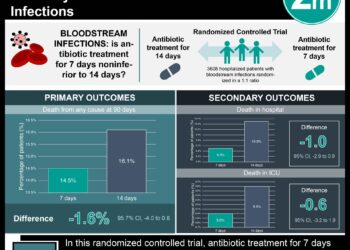Bacteremia in pediatric pneumonia associated with disease severity
1. In this retrospective analysis of prospectively collected data, researchers found that pediatric patients with pneumonia and bacteremia were more likely to have serious disease including longer hospital stays, increased likelihood of being in the intensive care unit (ICU), and increased need for mechanical ventilation.
2. Clinical outcomes varied based on the pathogen identified in bacteremic patients. Those with blood cultures positive for Staphylococcus aureus (S aureus) or Streptococcus pyogenes (S pyogenes) had increased risk of admission to the ICU, need for mechanical ventilation, or shock as compared to patients with Streptococcus pneumonia (S pneumonia) bacteremia.
Evidence Rating Level: 2 (Good)
Study Rundown: While pneumonia is a very common reason for pediatric hospitalization, there is little known about the prevalence and clinical significance of bacteremia in the setting of pediatric community-acquired pneumonia (CAP). In this study, researchers analyzed information from a previous surveillance study. Data regarding blood cultures from children admitted for CAP was reviewed. Bacteremia was discovered in only a small portion of patients and was associated with male sex, parapneumonic effusion or pleural drainage procedure, elevated procalcitonin levels, and blood culture collections prior to the start of antibiotics. Patients with bacteremia were more likely to have severe disease, as evidenced by increased likelihood for longer hospital stays, admission to the ICU, need for mechanical ventilation, and increased likelihood to experience shock. Patients diagnosed with S aureus bacteremia were more likely to have longer hospital stays than those with bacteremia from S pneumonia, while patients with bacteremia from S aureus or S pyogenes had increased risk of admission to the ICU, need for mechanical ventilation, or shock as compared to patients with S pneumonia bacteremia. Though few patients were ultimately found to have bacteremia, this study reveals the important clinical implications for individuals with disseminated disease.
Click here to read the original article, published today in Pediatrics
Relevant Reading: Evaluating the Use of Blood Cultures in the Management of Children Hospitalized for Community-Acquired Pneumonia
In-Depth [retrospective cohort]: Researchers analyzed data from the Etiology of Pneumonia in the Community (EPIC) study, which surveilled children under the age of 18 admitted to 1 of 3 children’s hospitals from January 1, 2010 to June 30, 2012 admitted for CAP management. Of the 2358 children included in the study, 2143 (91%) had blood cultures drawn which were included in the final analysis. Forty-six (2.2%, 95%CI 1.6-2.9%) ultimately had confirmed bacteremia. Bacteremia was associated with male sex (p = .008), elevated procalcitonin level (p = .001), parapneumonic effusion (p < .001), empyema with drainage procedure (p < .001), and blood cultures drawn prior to antibiotic administration (p < .001). Bacteremia was associated with longer hospital stay (5.8 vs. 2.8 days, HR 0.79, 95%CI 0.73-0.86), ICU admission (43% vs. 21%, OR 5.12, 95%CI 3.82-6.84), intubation/mechanical ventilation and/or shock (30% vs. 8%; OR 5.28; 95%CI 2.41-11.57). Bacteremia from S aureus was specifically associated with longer hospital stay as compared to bacteremia from S pneumonia (15 days vs. 3 days), and bacteremia from S aureus or S pyogenes was associated with ICU admission (100% and 73%, respectively, vs. 27%), intubation or mechanical ventilation and/or shock (67% and 75%, respectively, vs. 18%) compared to children with bacteremia from S pneumonia.
Image: PD
©2019 2 Minute Medicine, Inc. All rights reserved. No works may be reproduced without expressed written consent from 2 Minute Medicine, Inc. Inquire about licensing here. No article should be construed as medical advice and is not intended as such by the authors or by 2 Minute Medicine, Inc.







